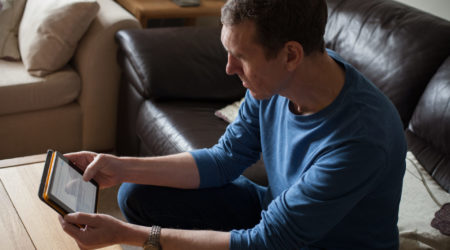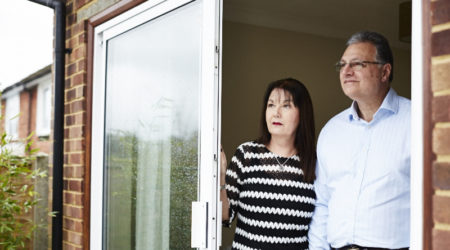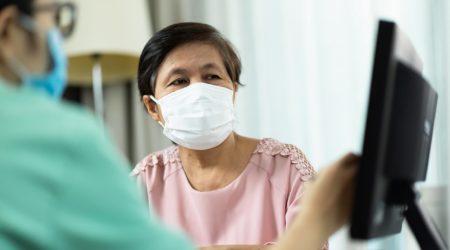Read all of our information about coronavirus
- Coronavirus
- What is the coronavirus (COVID-19)?
- How will coronavirus affect people with pancreatic cancer?
- Coronavirus vaccine and pancreatic cancer
- What does coronavirus mean for my treatment?
- Coronavirus information for people with symptoms of pancreatic cancer
- Information for families about coronavirus and pancreatic cancer
Speak to your medical team about what coronavirus might mean for your treatment. Each situation will be specific to the individual person, and different GP surgeries and hospitals will be doing things slightly differently. Your doctor or nurse can talk through what it means for you.
It is important that you go to medical appointments, and get support if you need it.
The NHS may provide support remotely – for example by telephone, email or video call. If you want to speak to your doctor or medical team face to face, you can ask for this. Be aware though that there may be a delay if the appointment needs to be changed due to clinic capacity.
If it is some time since you have seen your doctor or nurse face to face, it is important that you are seen regularly if your condition has changed, as you may need a more formal assessment.
Some hospital appointments may be changed, so confirm your appointment before going to the hospital.
There will be procedures in place to reduce the risk of coronavirus. For example, there may be social distancing in waiting rooms, and you may be asked not to arrive early for your appointment. The doctors and nurses will be wearing personal protective equipment (PPE) such as a face mask and gloves. They will also be having regular coronavirus tests. You may need to wear a mask at the hospital or GP surgery – unless you are staying overnight at the hospital (an inpatient).
You may also be asked to go to your appointment on your own if possible. You may find it helpful to speak to one of the medical team and explain why you need a loved one to go to your appointment with you.
Having tests or surgery
If you are going to hospital for a procedure such as tests or surgery, you may need to do a coronavirus test before you go into hospital. You and people you live with may also need to self-isolate beforehand. The hospital should give you more information about this. Your treatment might be delayed if you have coronavirus. If this happens, talk to the medical team about rearranging your appointment.
You may need to wear a face covering when you go to the hospital.
If you need to stay in hospital, there may be a limit to how many visitors you can have. You can check this on the hospital’s website. This is to help reduce the risk of coronavirus. It is a good idea to take a mobile phone or tablet and charger with you, so that you can talk to family and friends while you’re in hospital. Visitors may need to wear a face covering at the hospital.
After you have had your test or treatment, the doctor or nurse should explain what to do if you get symptoms of coronavirus after leaving hospital. They will also explain about any further care you might need.
Having chemotherapy
If you are having chemotherapy, you are at higher risk of getting seriously unwell from coronavirus. The medical team will take precautions to reduce the risk of you catching coronavirus. For example, you may need to take a coronavirus test before your appointment if you have any symptoms or feel more unwell than usual. If you haven’t yet had the vaccine, your doctor may advise you to have it.
Read more about things you can go do to protect yourself from coronavirus.
Chemotherapy and infections
If you are having chemotherapy, you are at higher risk of getting any infection, not just coronavirus. This means that it may not be clear whether symptoms are coronavirus or another infection. Read more about infections and chemotherapy.
Your chemotherapy team should give you a 24 hour emergency number to call if you are unwell or have symptoms of an infection. They will check whether you have coronavirus or another infection, and the treatment you need. You may not necessarily have the standard symptoms of coronavirus. For example, not everyone will feel hot – some people with a very high temperature will feel cold and shivery.
Your chemotherapy may be changed to try to reduce the chance of you getting an infection such as coronavirus. For example, your chemotherapy might be delayed, you might have a break in your chemotherapy, or you might have a different chemotherapy drug or combination of drugs. Decisions about any changes will be specific to your own situation, so talk to your doctor about any changes, and the risks and benefits of these.
If you are being cared for at home
If you are being cared for at home, your doctor or nurse may provide support over the phone. If you need more support, ask them to visit you at home. They will be able to take precautions, such as wearing a mask and gloves.
Getting information and support
You will probably have worries or questions about how coronavirus will affect your treatment. Speak to your doctor or nurse with any questions. You could also check your hospital website for information about current measures.
You can speak to our specialist nurses on our free Support Line with any questions. They can provide information tailored to your situation.
Read more about what treatment and appointments may be like at the moment in our blog.
Updated: September 2023




